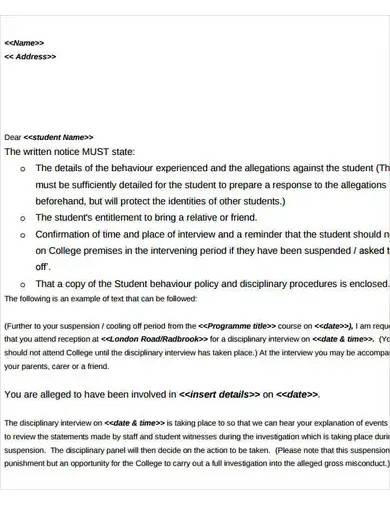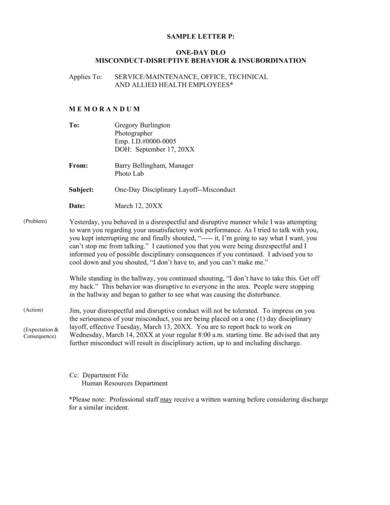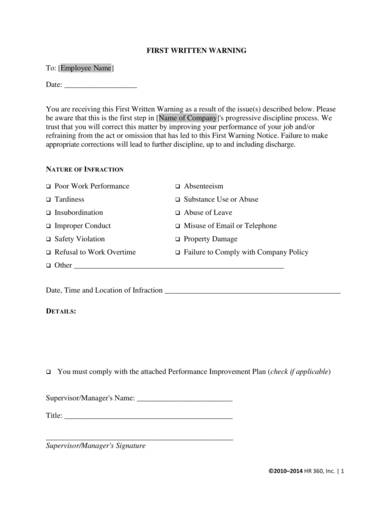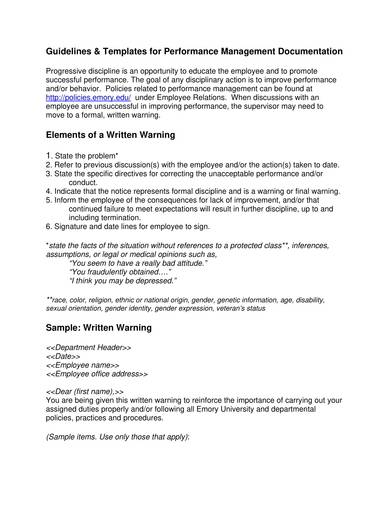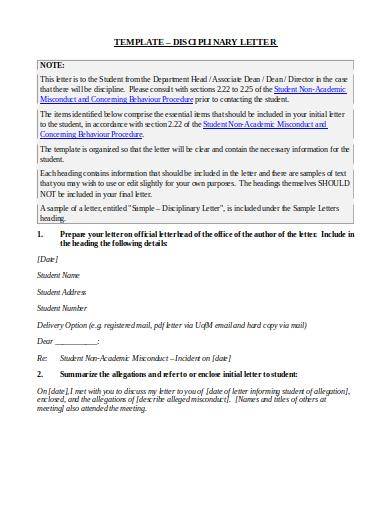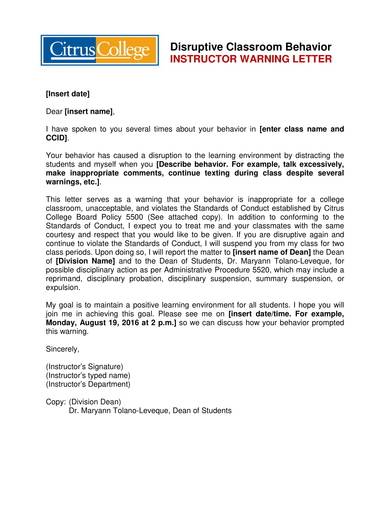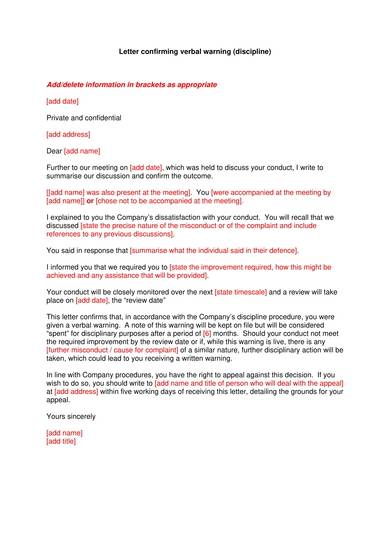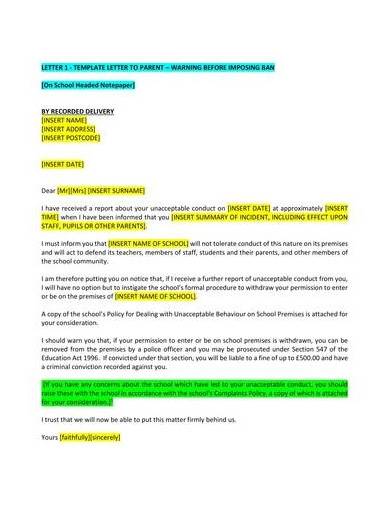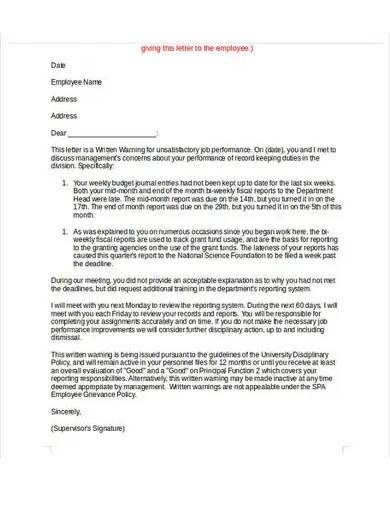Everywhere you go, there are mandatory rules that everyone needs to follow. You have stoplights, no parking zones, and no smoking areas as examples where you’re heeding predetermined statutes to help build a better community. This is no different inside various groups and organizations. They don’t only impose these guidelines of dos and don’ts; they also take necessary measures to demand consequences for those who deserve them. Delive this news using a behavior warning letter. This provides comprehensive details of a person’s violation and the required consequences to fix the issue. Read more about this below.
FREE 15+ Behavior Warning Letter Samples
1. Warning Notice for Behaviour Issues Template
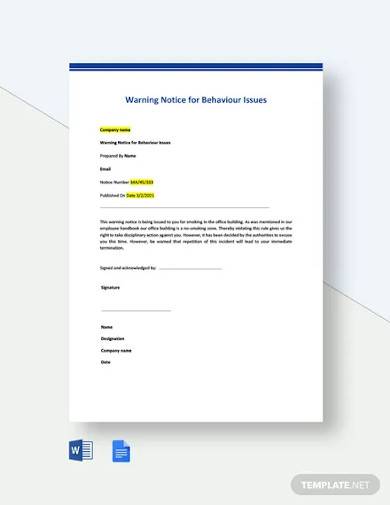
2. Final Warning Notice for Behaviour Issues Template
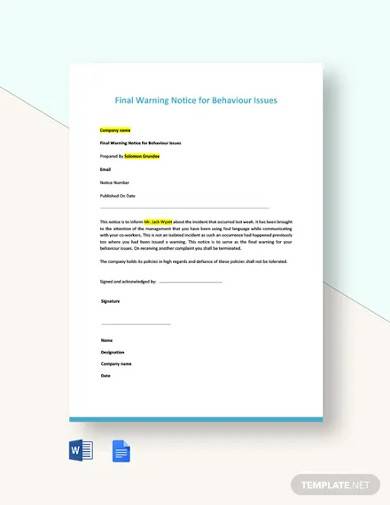
3. Warning Notice for General Behaviour Issues Template
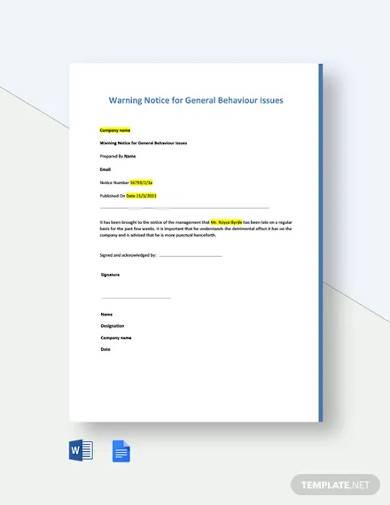
4. Free Behavior Warning Letter
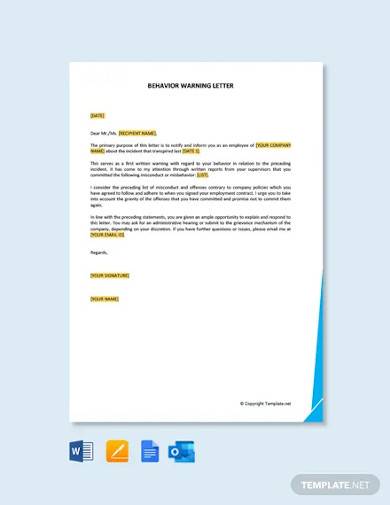
5. Free Warning Letter For Rude Behavior
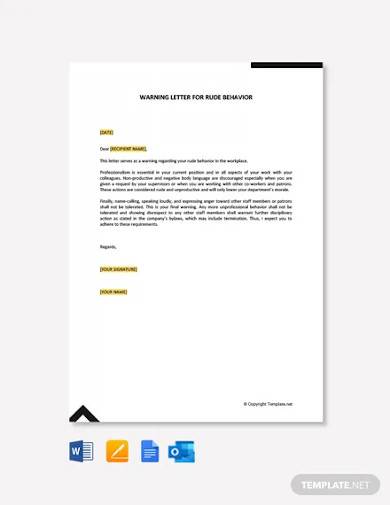
6. Free Warning Letter for Bad Behavior At Work
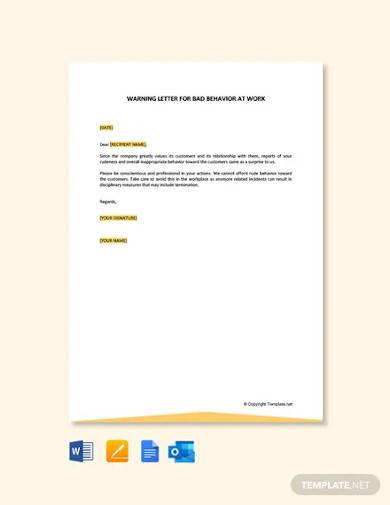
7. Free Warning Letter for Bad Behavior
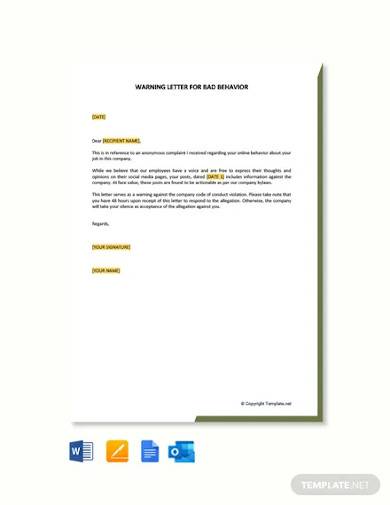
8. Student Behavior Warning Letter
9. Misconduct Warning Letter Sample
10. Sample First Written Warning Letter
11. Sample Written Warning Letter for Behavior
12. Inappropriate Behavior Warning Letter Sample
13. Classroom Behavior Warning Letter
14. Sample Letter of Confirming Verbal Warning
15. Warning Letter Sample to Parent
16. Unacceptable Behavior Warning Letter
What Is a Behavior Warning Letter?
A behavior warning letter is sent to a person to formally inform them that their misconducts violated the organization’s rules and regulations. It is a common practice in workplaces to enforce disciplinary actions towards bad behaviors that might affect its order and daily operation. More often than not, this is most commonly known as a written warning that comes after one or two verbal reprimands.
Different Reasons for Sending Warning Letters
Discipline is crucial in any group and organization across every industry. It is important in ensuring that the handbook’s clauses, the chain of command in an organizational structure, the rules of the process, and the peace and order among working individuals are firmly established. Besides that, workplace discipline is essential because it assures a safe environment, efficient working conditions, and impartiality.
Here are some reasons that constitute the sending of a warning letter:
1. Dress code violation – referring to not following the established dress code.
2. Hygiene – wearing excessive perfume; refusing to groom properly.
3. Insubordination – refusing to follow orders and arguing with workplace seniors and executives.
4. Poor performance – failing to meet the required productivity or the standards of a job description.
5. Absenteeism and tardiness – consistent absence without approval and a high number of late marks to work.
6. Sexual harassment – exhibiting unwanted or forced physical contact with a colleague or company guests; using explicit language.
7. Contempt – being disrespectful to coworkers, clients, administration, and executives.
8. Violating health and safety measures – performing an intentional act of putting everyone in the organization at risk of compromising their safety and health.
9. Violating confidentiality rule – breaking the non-disclosure agreement by sharing the company’s information to individuals or entities outside the organization.
10. Spreading false information – intentionally putting out fictitious information to malign, threaten, or taint a colleague’s reputation; openly talking about another person’s personal life.
How to Write a Behavior Warning Letter
If you want to learn how to write a behavior warning letter, you’re in luck! Here are some useful tips for you:
1. State the Why
When you send in your warning letter, be sure that you have a solid reason behind it. This is a serious matter that can incur legal actions. When writing the letter, determine what events led to making the action necessary. Did the misbehaving individual already receive multiple verbal warnings? Did he commit a severe policy violation? Are they at risk of a possible termination or suspension? You should clearly state this on your content. To back up your claims, cite a clause or line from your organization’s handbook that the person disobeyed.
2. Highlight Consequences
You’re probably going to personally discuss the extent of the misconduct and its underlying consequences. However, you still need to put it in writing. Be sure to explain how this will go and how long this needs to happen, so the person receiving this will better understand the process. Suppose it happens in an office setting, state whether it would be a week-long suspension or a service compensation. On a greater scale, explain that this might lead to sending an employee termination letter in the future. Be sure to make this as clear as possible.
3. Express What You Want to Change
State how you want things to change to ensure that the attitude problem, inappropriate behavior, and performance complaints get resolved. This way, you are giving a person another shot at making things right and fixing any misbehaviors. Explain if there would be any observation period or strict supervision for a certain amount of time to monitor their conduct. Remember that these details are important in your employee warning letter. While you may try to break the news of misconduct and its consequences as professionally and gently as possible, it would still sting. This part, however, allows the person to change.
4. Send the Letter ASAP
As soon as something disagreeable happens, a warning letter should immediately follow. This means that you’re taking the issue seriously and are willing to act on it on the spot. Delaying the inevitable would mean you’re lax in implementing the policies and company agreements of the organization. Deliver the letter not more than a week after the misbehavior and deliver it personally. Have the receiver sign the letter as well as two witnesses of the violation.
FAQs
What should be in your employee warning letter?
Here are some things that should be present in your employee warning letter:
- Employee’s name and position
- Information about the violation and the affected parties
- Violated rules on the policy
- Outline of consequences
- Corrective measures
- Signature of the supervisor, human resource manager, violating employee, and witnesses
Can you give a warning letter without a verbal warning first?
No rule specifies this, but it’s highly recommended to start with a verbal warning for first-degree or not severe offenses.
Who issues a warning letter?
In most cases, a human resource manager issues the warning letter because they know the employee policies more than anyone else.
Imposing discipline and demanding consequences play a crucial role in any operations. A process not guided by rules never starts nor ends well. Creating a space where everyone knows their limitations and bases their conduct according to what’s appropriate makes it a wonderful place to foster healthy relationships and connections. It’s also a place where everyone can efficiently achieve their objectives. A warning letter helps impose discipline. Go through our warning letter template collection and get yours now!
Related Posts
FREE 12+ Witness Letter Samples in PDF MS Word
FREE 9+ Termination Letters in MS Word PDF | Pages | Google Docs
FREE 90+ Sample Letter Templates in PDF
FREE 10+ School Excuse Letter Samples & Templates in MS Word ...
FREE 12+ Apology Letters to Teacher in PDF MS Word | Pages ...
FREE Sample Termination Letter for the Workplace [ How to Write ...
FREE 10+ School Disciplinary Action Form Samples & Templates in ...
FREE 8+ Sample Employee Notice Forms in MS Word PDF
FREE 9+ Employee Memo Templates in PDF
FREE Are Employers Required to Give Notice of Layoff? [ With ...
FREE A Guide to Employee Terminations [ With Samples ]
FREE 36+ Complaint Letter Samples in MS Word Pages | Google ...
FREE Guidelines for Termination Letter [ With Samples ]
FREE 10+ Sample Employee Discipline Forms in PDF MS Word
FREE 12+ Behavior Contract Templates in PDF MS Word | Excel

